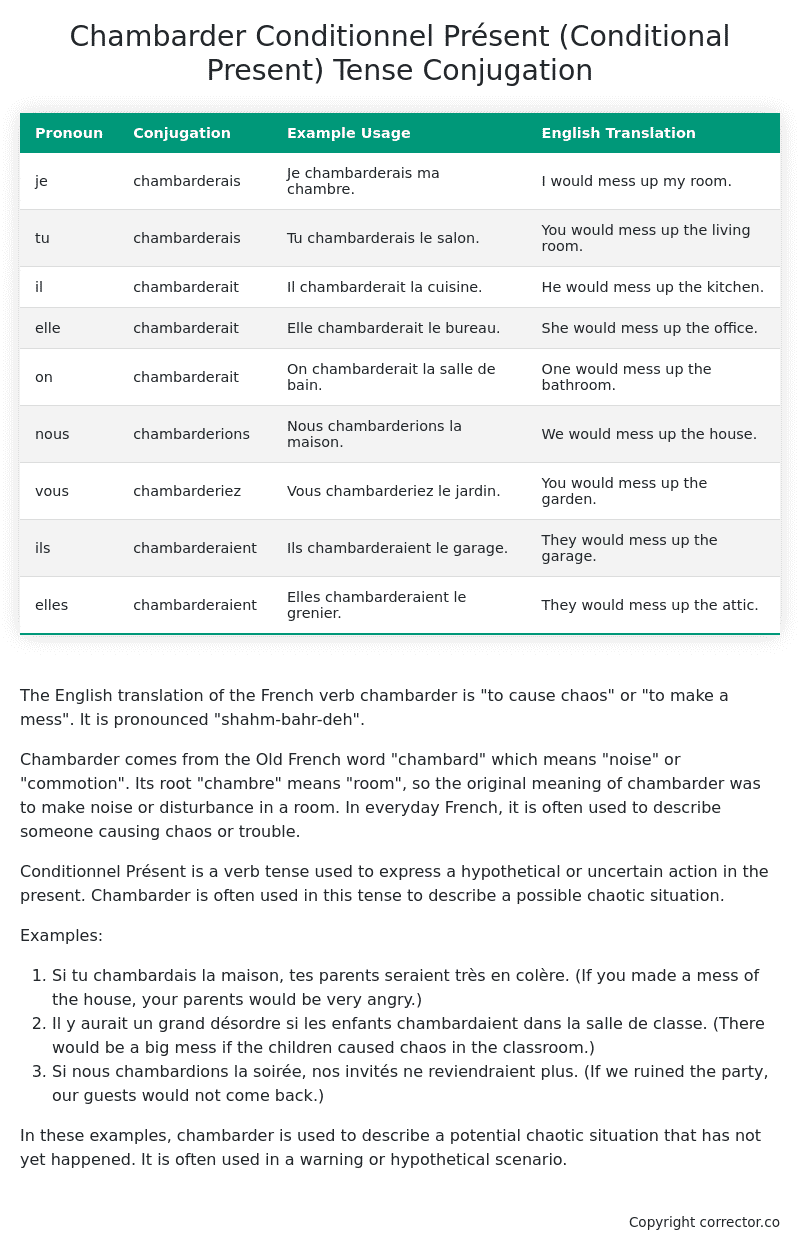Conditionnel Présent (Conditional Present) Tense Conjugation of the French Verb chambarder
Introduction to the verb chambarder
The English translation of the French verb chambarder is “to cause chaos” or “to make a mess”. It is pronounced “shahm-bahr-deh”.
Chambarder comes from the Old French word “chambard” which means “noise” or “commotion”. Its root “chambre” means “room”, so the original meaning of chambarder was to make noise or disturbance in a room. In everyday French, it is often used to describe someone causing chaos or trouble.
Conditionnel Présent is a verb tense used to express a hypothetical or uncertain action in the present. Chambarder is often used in this tense to describe a possible chaotic situation.
Examples:
- Si tu chambardais la maison, tes parents seraient très en colère. (If you made a mess of the house, your parents would be very angry.)
- Il y aurait un grand désordre si les enfants chambardaient dans la salle de classe. (There would be a big mess if the children caused chaos in the classroom.)
- Si nous chambardions la soirée, nos invités ne reviendraient plus. (If we ruined the party, our guests would not come back.)
In these examples, chambarder is used to describe a potential chaotic situation that has not yet happened. It is often used in a warning or hypothetical scenario.
Table of the Conditionnel Présent (Conditional Present) Tense Conjugation of chambarder
| Pronoun | Conjugation | Example Usage | English Translation |
|---|---|---|---|
| je | chambarderais | Je chambarderais ma chambre. | I would mess up my room. |
| tu | chambarderais | Tu chambarderais le salon. | You would mess up the living room. |
| il | chambarderait | Il chambarderait la cuisine. | He would mess up the kitchen. |
| elle | chambarderait | Elle chambarderait le bureau. | She would mess up the office. |
| on | chambarderait | On chambarderait la salle de bain. | One would mess up the bathroom. |
| nous | chambarderions | Nous chambarderions la maison. | We would mess up the house. |
| vous | chambarderiez | Vous chambarderiez le jardin. | You would mess up the garden. |
| ils | chambarderaient | Ils chambarderaient le garage. | They would mess up the garage. |
| elles | chambarderaient | Elles chambarderaient le grenier. | They would mess up the attic. |
Other Conjugations for Chambarder.
Le Present (Present Tense) Conjugation of the French Verb chambarder
Imparfait (Imperfect) Tense Conjugation of the French Verb chambarder
Passé Simple (Simple Past) Tense Conjugation of the French Verb chambarder
Passé Composé (Present Perfect) Tense Conjugation of the French Verb chambarder
Futur Simple (Simple Future) Tense Conjugation of the French Verb chambarder
Futur Proche (Near Future) Tense Conjugation of the French Verb chambarder
Plus-que-parfait (Pluperfect) Tense Conjugation of the French Verb chambarder
Passé Antérieur (Past Anterior) Tense Conjugation of the French Verb chambarder
Futur Antérieur (Future Anterior) Tense Conjugation of the French Verb chambarder
Subjonctif Présent (Subjunctive Present) Tense Conjugation of the French Verb chambarder
Subjonctif Passé (Subjunctive Past) Tense Conjugation of the French Verb chambarder
Subjonctif Imparfait (Subjunctive Imperfect) Tense Conjugation of the French Verb chambarder
Subjonctif Plus-que-parfait (Subjunctive Pluperfect) Tense Conjugation of the French Verb chambarder
Conditionnel Présent (Conditional Present) Tense Conjugation of the French Verb chambarder (this article)
Conditionnel Passé (Conditional Past) Tense Conjugation of the French Verb chambarder
L’impératif Présent (Imperative Present) Tense Conjugation of the French Verb chambarder
L’infinitif Présent (Infinitive Present) Tense Conjugation of the French Verb chambarder
Struggling with French verbs or the language in general? Why not use our free French Grammar Checker – no registration required!
Get a FREE Download Study Sheet of this Conjugation 🔥
Simply right click the image below, click “save image” and get your free reference for the chambarder Conditionnel Présent tense conjugation!

Chambarder – About the French Conditionnel Présent (Conditional Present) Tense
Formation
Common Everyday Usage Patterns
Expressing Polite Requests
Expressing Hypothetical Situations
Expressing Doubt or Uncertainty
Interactions with Other Tenses
Present Tense
Past Tense
Future Tense
Conditional Perfect
Summary
Want More?
I hope you enjoyed this article on the verb chambarder. Still in a learning mood? Check out another TOTALLY random French verb conjugation!


